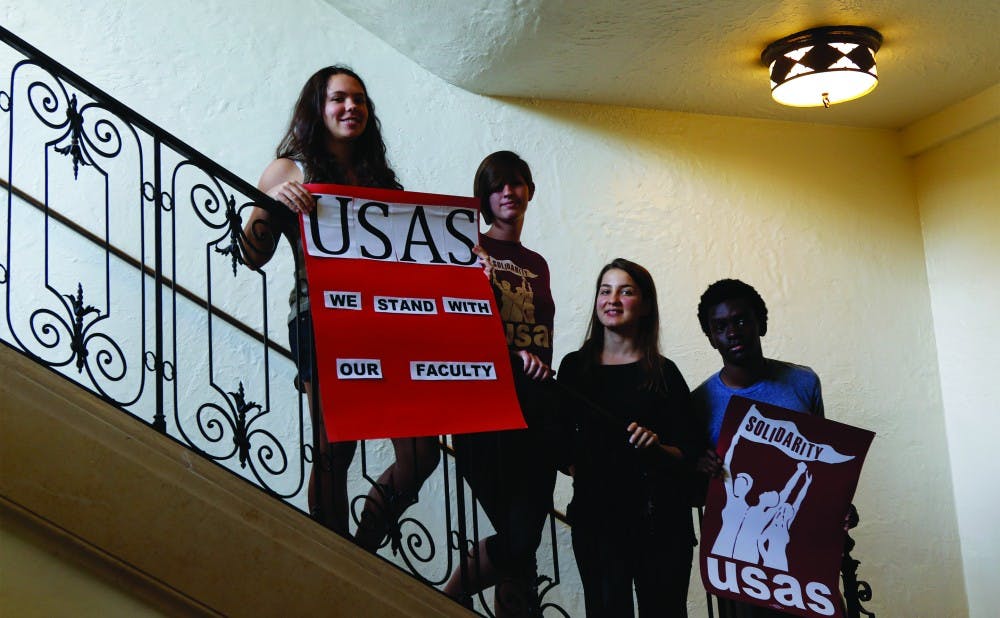Four students representing Duke United Students Against Sweatshops presented a petition to President Richard Brodhead’s office voicing their support of non-tenure track faculty Wednesday afternoon.
The petition—which garnered more than 400 signatures in two weeks—was a statement of student support for non-tenure track faculty who desire better job security and higher wages. A group of these faculty members called Duke Teaching First announced their intent to unionize Monday. Junior Zoe Willingham, president of USAS, said that the goal of the petition is to ask Brodhead to remain neutral as faculty members organize for better working conditions rather than opposing the group. Brodhead was not present and did not receive the petition personally.
“As students, we want professors to be treated with dignity in the workplace and feel financially secure as well,” Willingham said.
Undergraduate students as well as community members who have connections with the University signed the petition, which USAS circulated on Facebook. They presented the signed document to Brodhead’s office in the Allen Building at 3 p.m. Wednesday.
According to chapter two of the Duke Faculty Handbook, “the conventional designations of full-time members of the regular rank tenure track faculty are assistant professor, associate professor, and professor.” Data released by the University to the Department of Education based on nine-month contracts shows that the average salary for Duke professors, associate professors and assistant professors is more than $84,000, and the average salary for unranked faculty, lecturers and instructors at the University is less than $57,000.
Willingham argued that non-tenure track faculty currently lack a voice on campus and said that USAS desires to change that, noting that many faculty members right now are having a difficult time doing the best they can for students. The petition—written by Willingham and members of Duke Teaching First—states that it aims to “make improvements in transparency, stability and respect for all faculty and students.”
Problems that non-tenure track faculty face include low wages and uncertain contracts, noted sophomore Ashlyn Nuckols, the media communications chair for USAS. She explained that faculty members’ contracts only last for one semester, leaving them uncertain about their futures.
“It puts worry and strain on them and makes it a lot harder for them to focus on providing care for their students,” she said.
Betsy Tremmel, adjunct professor of English for international students and member of Duke Teaching First, wrote in an email that she is thrilled with the support from USAS.
“I think some students may assume . . . that all instructors are compensated equally for their time and effort in teaching, that they all have health insurance, and that they all have secure jobs,” she wrote. “Duke Teaching First wants to work to help make that assumption a reality.”
Because many people do not know about problems that non-tenure track faculty face, USAS kicked off a campaign at the beginning of the semester to generate conversations on campus about these issues, Williingham said. They began with the petition to spotlight the issue. She added that USAS will continue to support Duke Teaching First as the group unionizes.
The unfair treatment of non-tenure track faculty at Duke is a symptom of a national problem, Nuckols said.
“It will be beneficial to students and administrators if Duke can become a leader in trying to change this trend,” she said.
Willingham noted that she hopes Brodhead will respond to the petition with a statement confirming his neutrality in matters related to Duke Teaching First.
USAS is optimistic about the effect the petition will have on the administration, Nuckols explained.
“We’re confident that President Brodhead will receive it and respond in a positive way,” she said.
Get The Chronicle straight to your inbox
Signup for our weekly newsletter. Cancel at any time.

